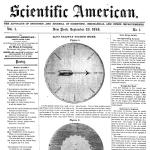Scientific American (SciAm) set social media on fire this week by endorsing Kam
Scientific American
Last week I highlighted four disturbing trends in science journalism that are destroying the public's trust in mainstream academic and publi
In August 2020, Scientific American offered its readers some spot-on advice about how to evaluate the constant stream of COVID-19 research we're all subjected to.
One of the biggest mistakes that scientists have made in recent years is to become overtly political. Scientific American has taken it a step further and endorsed Joe Biden for President.
“Since at least the 17th century, science has struggled with words.
For Scientific American, the year 2019 will go down in history, but certainly not in the way the 174-year-old publication intended. After publishing at least two thoroughly unscientific and inept articles, SciAm has produced a third.
It's official. Scientific American will publish absolutely anything.









